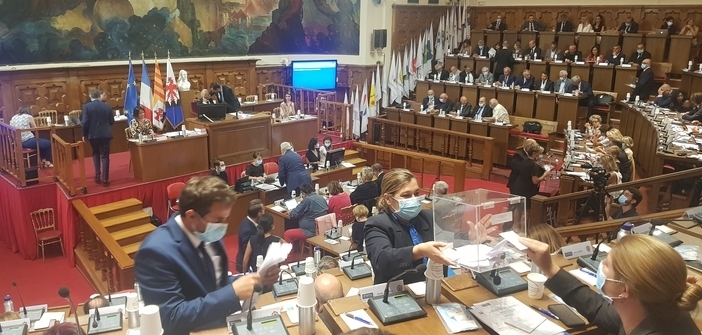:
It was a formality. Christian Estrosi was re-elected as president of the Nice Côte d’Azur metropolitan area for the next six years. This marks his 3rd election at the head of this community created in January 2012.
Moreover, how could the outcome be any different when the opposition groups could only count on 14 votes (eight for the RN and six for the ecologists) out of 130? There might have been doubts about the new mayor of La Trinité Ladislas Polski (from various left parties) who was elected on a civic list (“Vigilant and combative, partner and not vassal, I will work within the metropolitan executive, in a spirit of sacred union for the general interest,” he thus justified his vote for Christian Estrosi) and Christelle d’Intorni from La Ciotat, mayor of Rimplas – who in the last years of the previous mandate played the role of Calamity Jane for her inspirer in the showdown he had initiated with the mayor of Nice for the candidacy of the capital of the Côte d’Azur. But once the game was lost, she fell into line, additionally receiving one of the 20 vice-presidencies, that of major cultural events.
In total, Christian Estrosi received 116 votes. Louis Nègre and Philippe Pradal will be the deputy presidents. Dominique Estrosi-Sassone is the president of the majority group renamed Métropole Solidaire instead of Ensemble.
In his inaugural speech, Christian Estrosi was not sparing in praises for himself.
“During the crisis, the state was exposed. So let us draw the consequences! The state must transfer to communities everything it no longer knows how to do or everything it does poorly. Because we were there when it mattered!” he claims, echoing a document from Territoires Unis (which brings together the associations of regions, departments, and town halls) under the aegis of Senate President Gérard Larcher, who is currently conducting intense lobbying activities to guide the decisions that will need to be made in terms of public competences reorganization in the coming months.
They pompously call this “ascending subsidiarity,” namely a transfer of competences and financial resources from central structures (ministries and national agencies) to local communities, which they largely politically dominate and represent.
Regarding a potential second wave of the virus, Christian Estrosi aimed to be more reassuring. According to him, the metropolis, thanks to reinforced strategic stocks of masks and gel, can last four months in case of an epidemic resurgence. That is good.
If, in the meantime, there were better respect for barrier gestures in public sessions, that would be even better.
The economic crisis – which, according to him, is expected to be worse than the financial crisis of 2008 –
was the second focus of his intervention.
Christian Estrosi spoke at length about the major projects underway: eco-valley, multi-modal hub, Victorine film studios, and the national interest market (MIN).
“Our historical strength is tourism,” he affirmed.
The metropolitan area welcomes 10 million tourists a year. While Nice seeks to organize an offer for quality tourism rather than mass tourism (which is not synonymous with success because all tourist cities have the same ambition), Christian Estrosi also aims to diversify the offer by focusing on business tourism with the realization of the multi-modal hub and the new convention center on the MIN site.
His ambition is to compete with other large metropolises like Barcelona and Milan. That’s good, except that the road seems steep as these areas have a volume roughly ten times greater than the future Nice development.
Faced with the green wave that shook the political balance in many cities during the municipal elections, Nice has escaped it, but the subject remains current, and Christian Estrosi has embraced the theme of ecology:
Following a general declaration of faith, “We must move, heat, and cool ourselves with local energy.” He followed with the announcement of a goal “Zero plastic by 2026,” fully decarbonized public transportation by 2026, and a 30% increase in agricultural autonomy, specifying that already the exploitable agricultural land has increased from 5,000 ha to 6,000 ha, or 1,000 ha more open to production.
As a pledge of commitment, he appointed – as he did at the Nice City Hall – Dr. Richard Chemla as the president of the Ecology Commission in charge of a transversal coordination policy for a “responsible ecology.” Time will tell what significance to attribute to this adjective and how it will be implemented.
The opposition wants to be heard
Philippe Vardon, who garnered 21% of the votes in the municipal elections in Nice, spoke following the President of the Metropolis, not hiding his frustration: “I envy you,” he begins. Quickly, he goes on the offensive and criticizes the former mandate of the Republican elected official: “The Mayors saw their freedoms diminish, in 2016 and 2017, almost all the Metro funds were in favor of the city of Nice. In 2018, Christian Estrosi imposed the metropolitan tax, the Estrosi tax, on the entire metropolis to push his grandiose projects ever further,” exclaims the National Rally elected official.
On her side, Juliette Chesnel Le Roux (Nice Ecology) thanks with humility and gratitude those who gave a voice to the opposition. “The environmentalist concern is spreading throughout the territory, we are proud of it,” she affirms before continuing: “our citizens are demanding localism, they say stop to overdevelopment to the detriment of the quality of life of the local population.” The ecologist elected official deems Christian Estrosi’s record unacceptable and specifies that her party will be a force of proposals to protect the territories, increase their autonomy, and their resilience. “It’s time for our territory to engage in the ecological transition,” she concludes.


